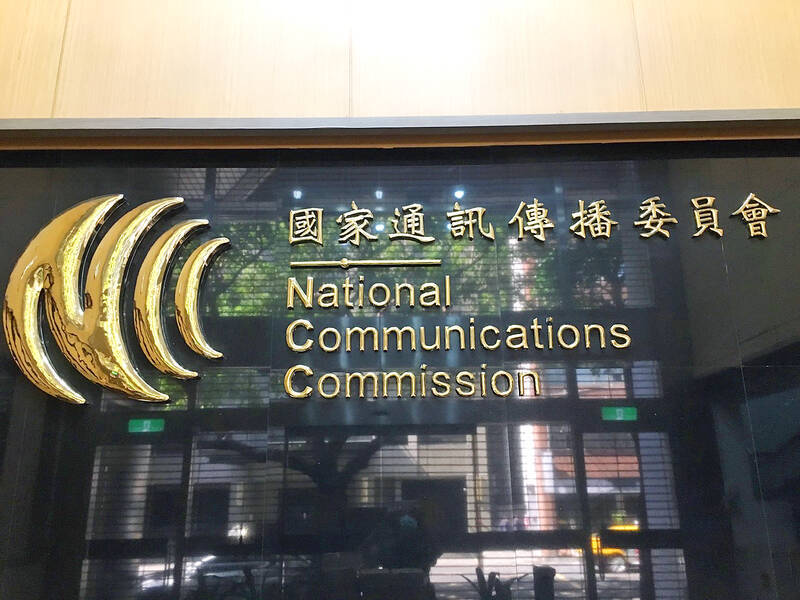A man who illegally set up a mobile base station in a rental car to distribute phishing messages was fined NT$4 million (US$125,984) for contravening the Telecommunications Management Act (電信管理法), the National Communications Commission (NCC) said yesterday.
This was the first time that the telecom regulator issued an administrative fine to an individual for setting up an unauthorized base station.
The Criminal Investigation Bureau’s Telecommunications Investigation Corp on Nov. 18 last year arrested a man surnamed Kuo (郭) near Taipei’s Zhongshan MRT Station for allegedly carrying a mobile base station in a rental car to distribute phishing messages, NCC Vice Chairman and spokesman Wong Po-tsung (翁柏宗) told a news conference yesterday afternoon.

Photo: Yang Mien-chieh, Taipei Times
The illegal mobile base station was confiscated on the spot, he said.
“Recipients of the messages were told that Far Eastern Toll Collection Co (FETC), the operator of freeway toll tag eTag, failed to collect their toll fees, and they needed to re-enter billing information on their credit cards,” Wong said. “They were subsequently instructed to click on a link to a fake Web page and enter their credit card information.”
Kuo and his cohorts added the illegally obtained credit card information to their mobile payment system, allowing them to purchase mobile phones or other high-end electronic products, the commission said.
Telecommunications Investigation Corp further identified through its 165 Anti-Fraud Hotline database 30 more similar cases that happened from September to November last year, in which victims’ credit card information was stolen after clicking on a link in messages allegedly pretending to be sent by FETC or E.Sun Commercial Bank, the commussion said.
The collective financial losses were estimated to exceed NT$3 million, it said, adding that the Yunlin District Prosecutors’ Office on April 10 indicted Kuo and 11 other individuals for contravening the Criminal Code and Organized Crime Prevention Act (組織犯罪防制條例).
After examining the results of the investigation conducted by Telecommunications Investigation Corp, the NCC decided that Kuo had contravened Article 52 of the Telecommunications Management Act for using part of radio frequency band in 1,800MHz without first securing approval from the commission, Wong said, adding that the fine ranges from NT$1 million to NT$10 million.
“By using an illegal mobile base station, Kuo interfered with the use of the frequency band by its legal user, illegally collected personal data from 22 people and reaped illegal profits topping NT$2 million,” Wong said. “As such, the commission decided to toughen the sanction by setting the fine at NT$4 million.”
The mobile base station that Kuo used was able to overwhelm the reception of signals sent by the frequency band’s legal user, as it is a 2G system, which does not have a two-way verification system, Wong said.
The commission is still investigating how Kuo and his cohorts obtained the illegal mobile base station — whether it was imported from overseas or manufactured in Taiwan, he said, adding that the fine for illegally importing or manufacturing radio frequency products is between NT$10,000 and NT$1 million.
Kuo imported five mobile base stations from China, and prosecutors are still tracing four other base stations and more scammers, some media reports said.

Taiwan is to commence mass production of the Tien Kung (天弓, “Sky Bow”) III, IV and V missiles by the second quarter of this year if the legislature approves the government’s NT$1.25 trillion (US$39.78 billion) special defense budget, an official said yesterday. Commenting on condition of anonymity, a defense official with knowledge of the matter said that the advanced systems are expected to provide crucial capabilities against ballistic and cruise missiles for the proposed “T-Dome,” an advanced, multi-layered air defense network. The Tien Kung III is an air defense missile with a maximum interception altitude of 35km. The Tien Kung IV and V

The disruption of 941 flights in and out of Taiwan due to China’s large-scale military exercises was no accident, but rather the result of a “quasi-blockade” used to simulate creating the air and sea routes needed for an amphibious landing, a military expert said. The disruptions occurred on Tuesday and lasted about 10 hours as China conducted live-fire drills in the Taiwan Strait. The Civil Aviation Administration (CAA) said the exercises affected 857 international flights and 84 domestic flights, affecting more than 100,000 travelers. Su Tzu-yun (蘇紫雲), a research fellow at the government-sponsored Institute for National Defense and Security Research, said the air

Trips for more than 100,000 international and domestic air travelers could be disrupted as China launches a military exercise around Taiwan today, Taiwan’s Civil Aviation Administration (CAA) said yesterday. The exercise could affect nearly 900 flights scheduled to enter the Taipei Flight Information Region (FIR) during the exercise window, it added. A notice issued by the Chinese Civil Aviation Administration showed there would be seven temporary zones around the Taiwan Strait which would be used for live-fire exercises, lasting from 8am to 6pm today. All aircraft are prohibited from entering during exercise, it says. Taipei FIR has 14 international air routes and

Taiwan lacks effective and cost-efficient armaments to intercept rockets, making the planned “T-Dome” interception system necessary, two experts said on Tuesday. The concerns were raised after China’s military fired two waves of rockets during live-fire drills around Taiwan on Tuesday, part of two-day exercises code-named “Justice Mission 2025.” The first wave involved 17 rockets launched at 9am from Pingtan in China’s Fujian Province, according to Lieutenant General Hsieh Jih-sheng (謝日升) of the Office of the Deputy Chief of the General Staff for Intelligence at the Ministry of National Defense. Those rockets landed 70 nautical miles (129.6km) northeast of Keelung without flying over Taiwan,